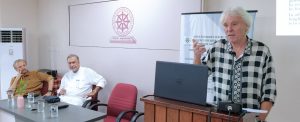
Kerala’s democratic ethos positions it uniquely to chart a path of partnership governance and inclusive development, standing as a potential global model amidst crises, according to Olle Törnquist, Swedish social scientist and Professor Emeritus, University of Oslo. Delivering the Immanuel Wallerstein Memorial Lecture 2024, organized by the Inter University Centre for Social Science Research and Extension (IUCSSRE) at Mahatma Gandhi University (MGU), Törnquist emphasized that leveraging international cooperation and local innovation could enable Kerala to address its fiscal, political, and governance challenges.
Highlighting Kerala’s history of social democratic-oriented development, Törnquist noted its widely regarded model of progress, which emerged from collective movements, universal education, land reforms, and a prioritization of human rights. Despite limited resources, Kerala successfully addressed chronic poverty and deprivation through investments in human capital, fostering substantial growth. Democratic education, organization, and governance, he argued, allowed the state to achieve these outcomes without succumbing to authoritarian models—marking a stark contrast to other left-oriented movements globally.
However, Törnquist cautioned that Kerala’s social democratic model faces critical challenges in the context of global crises, including exploitation, wars, climate change, and the rise of conservative nationalism. He characterized this nationalism as a direct threat to modern development, democratic rights, and international regulations. Drawing parallels to the anti-colonial movements of the past, he called for a global resistance movement to address these challenges. At the same time, Törnquist warned against defending the aging Western liberal order, which he argued has contributed to the current impasse.
The rise of conservative nationalism, according to Törnquist, emerges from frustrations with global neoliberalism, elite-driven democracies, and the erosion of progressive alternatives. This nationalism has paved the way for a global shift towards state-supported capital and oligarch competition, accompanied by increasing autocratization, he noted.
The lecture opened with an inaugural address by Prof. C.T. Aravindakumar, Vice-Chancellor of MGU, and was chaired by Michael Tharakan, former Vice-Chancellor of Kannur University. K.M. Seethi, Director of IUCSSRE, delivered the welcome address.